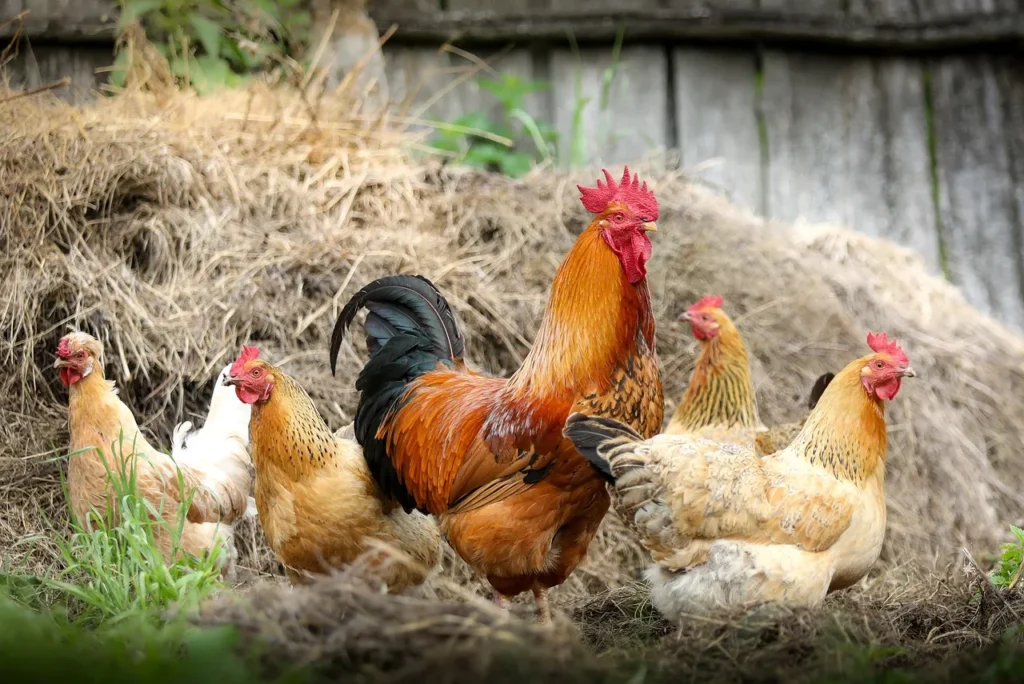
Introduction
In recent years, the demand for organic and free-range poultry products has increased significantly. Consumers are becoming more health-conscious and prefer antibiotic-free, naturally raised poultry over conventionally farmed broilers. In this context, Sonali chickens have emerged as a popular breed for free-range and organic poultry farming due to their adaptability, superior meat quality, and economic benefits. This blog explores the importance of Sonali chickens in sustainable poultry farming and why they are the preferred choice for organic farmers.
What is Sonali Chicken?
Sonali chicken is a hybrid breed developed by crossing Rhode Island Red (RIR) cocks with Fayoumi hens. Originating in Bangladesh, Sonali chickens are now widely raised in India and other South Asian countries. This breed is highly valued for its fast growth, strong immunity, and ability to thrive in free-range farming conditions.
Unlike broilers, which are raised in confined spaces with high dependency on commercial feed, Sonali chickens can efficiently forage for natural food sources, making them ideal for organic and sustainable farming practices.
Why Sonali Chickens are Ideal for Free-Range Farming
- Hardiness and Adaptability
Sonali chickens are known for their resilience and ability to withstand different environmental conditions. They can be raised in diverse climates, from hot and humid regions to cooler areas, making them suitable for farmers across India. - Excellent Foraging Ability
Free-range poultry farming relies on birds scavenging for food in open pastures. Sonali chickens are natural foragers, consuming insects, greens, and grains, which helps reduce feed costs and ensures they receive a more balanced and natural diet. - Disease Resistance
One of the biggest challenges in poultry farming is disease management. Sonali chickens have a strong immune system compared to commercial broilers, requiring fewer antibiotics and medical interventions. This makes them an excellent choice for organic farming, where synthetic medications are limited. - Better Meat Quality
The meat of Sonali chickens is leaner, firmer, and more flavorful than that of broilers. Due to their active lifestyle in free-range conditions, their meat contains lower fat levels and higher protein content, making it a healthier choice for consumers. - Higher Egg Production
In addition to meat production, Sonali chickens are also good layers, producing around 160-200 eggs per year. This dual-purpose capability makes them a profitable choice for farmers who want to diversify their income.
The Role of Sonali Chickens in Organic Poultry Farming
Organic poultry farming emphasizes raising birds in a natural environment, using organic feed, and avoiding synthetic chemicals. Sonali chickens play a crucial role in this system for several reasons:
- Low Dependency on Commercial Feed
Organic farming discourages the use of genetically modified or chemically processed feed. Sonali chickens can thrive on farm-grown grains, kitchen scraps, and pasture-based diets, making them highly suitable for organic setups. - Antibiotic-Free and Hormone-Free Growth
Since organic farming prohibits the use of growth hormones and routine antibiotics, Sonali chickens, with their natural disease resistance, fit perfectly into this model. Farmers can raise them with minimal medical intervention, ensuring cleaner, healthier poultry products. - Sustainability and Environmental Benefits
Free-range and organic farming reduce the environmental impact of poultry production. Sonali chickens help maintain ecological balance by controlling insects, fertilizing soil with their manure, and requiring less intensive farming practices. - Ethical and Humane Farming Practices
Ethical poultry farming is gaining importance, and consumers prefer meat from birds raised in humane conditions. Sonali chickens, when raised in free-range systems, enjoy a better quality of life with access to fresh air, natural sunlight, and open spaces.
Economic Benefits for Farmers
- Reduced Feed Costs
Free-range farming with Sonali chickens lowers dependency on commercial feed, significantly reducing overall production costs. - Higher Market Value
Organic and free-range poultry products fetch higher prices in the market. Consumers are willing to pay a premium for Sonali chicken meat due to its superior taste, nutritional value, and ethical farming methods. - Low Mortality Rate
Due to their hardy nature, Sonali chickens have a lower mortality rate compared to broilers, reducing financial losses for farmers. - Multiple Revenue Streams
Since Sonali chickens are dual-purpose, farmers can generate income from both meat and egg production, ensuring steady cash flow.
Challenges in Raising Sonali Chickens for Organic Farming
While Sonali chickens are ideal for free-range and organic farming, some challenges exist:
- Land Requirement: Free-range farming requires more space compared to conventional poultry farming.
- Predator Protection: Farmers need to invest in proper fencing and shelters to protect chickens from predators.
- Market Awareness: Many consumers are still unaware of the benefits of Sonali chicken meat, requiring marketing efforts to educate potential buyers.
Conclusion
Sonali chickens are revolutionizing free-range and organic poultry farming in India. Their adaptability, natural disease resistance, and high-quality meat make them a valuable asset for farmers looking to adopt sustainable and profitable poultry farming practices. As consumer demand for healthy, antibiotic-free poultry grows, Sonali chickens will continue to play a significant role in shaping the future of organic poultry farming.


